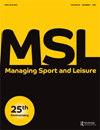求助PDF
{"title":"2019冠状病毒病背景下体育赛事的转型与传播","authors":"Elisenda Estanyol, Ana-Belen Fernandez-Souto, M. Vázquez-Gestal","doi":"10.1080/23750472.2023.2200417","DOIUrl":null,"url":null,"abstract":"Purpose: This research analyzes how the Spanish Sports Federations have adapted their communications and events during the different phases of the COVID-19 pandemic (March 2020–March 2022). Methods: The Communication Managers of these organizations have been contacted (N = 65), initially using surveys (n1= 45), and later using semi-structured interviews (n2= 9). Findings: The results show that, after the cancelation of all events in the Spring of 2020, virtual or hybrid events were adopted (39.1% in 2021). When the health situation improved, the first face-to-face events prioritized absolute and senior categories, in \"bubbles” and without public attendance. 2022 has meant returning to face-to-face formats (with only 10.9% of hybrid events), limiting the virtual events to training sessions. The Federations' communication strategy also changed during the pandemic: 41.3% switched channels (more streaming, their own channels and social channels), and focused on new techniques and content including more athletes' personal stories. Practical Implications and Research Contribution: The results provide insights into how sports organizations can communicate and organize sports events in future scenarios where face-to-face interactions are not possible. © 2023 Informa UK Limited, trading as Taylor & Francis Group.","PeriodicalId":45947,"journal":{"name":"Managing Sport and Leisure","volume":" ","pages":""},"PeriodicalIF":1.9000,"publicationDate":"2023-04-15","publicationTypes":"Journal Article","fieldsOfStudy":null,"isOpenAccess":false,"openAccessPdf":"","citationCount":"1","resultStr":"{\"title\":\"Transformation and communication in sports events in the context of COVID-19\",\"authors\":\"Elisenda Estanyol, Ana-Belen Fernandez-Souto, M. Vázquez-Gestal\",\"doi\":\"10.1080/23750472.2023.2200417\",\"DOIUrl\":null,\"url\":null,\"abstract\":\"Purpose: This research analyzes how the Spanish Sports Federations have adapted their communications and events during the different phases of the COVID-19 pandemic (March 2020–March 2022). Methods: The Communication Managers of these organizations have been contacted (N = 65), initially using surveys (n1= 45), and later using semi-structured interviews (n2= 9). Findings: The results show that, after the cancelation of all events in the Spring of 2020, virtual or hybrid events were adopted (39.1% in 2021). When the health situation improved, the first face-to-face events prioritized absolute and senior categories, in \\\"bubbles” and without public attendance. 2022 has meant returning to face-to-face formats (with only 10.9% of hybrid events), limiting the virtual events to training sessions. The Federations' communication strategy also changed during the pandemic: 41.3% switched channels (more streaming, their own channels and social channels), and focused on new techniques and content including more athletes' personal stories. Practical Implications and Research Contribution: The results provide insights into how sports organizations can communicate and organize sports events in future scenarios where face-to-face interactions are not possible. © 2023 Informa UK Limited, trading as Taylor & Francis Group.\",\"PeriodicalId\":45947,\"journal\":{\"name\":\"Managing Sport and Leisure\",\"volume\":\" \",\"pages\":\"\"},\"PeriodicalIF\":1.9000,\"publicationDate\":\"2023-04-15\",\"publicationTypes\":\"Journal Article\",\"fieldsOfStudy\":null,\"isOpenAccess\":false,\"openAccessPdf\":\"\",\"citationCount\":\"1\",\"resultStr\":null,\"platform\":\"Semanticscholar\",\"paperid\":null,\"PeriodicalName\":\"Managing Sport and Leisure\",\"FirstCategoryId\":\"1085\",\"ListUrlMain\":\"https://doi.org/10.1080/23750472.2023.2200417\",\"RegionNum\":0,\"RegionCategory\":null,\"ArticlePicture\":[],\"TitleCN\":null,\"AbstractTextCN\":null,\"PMCID\":null,\"EPubDate\":\"\",\"PubModel\":\"\",\"JCR\":\"Q3\",\"JCRName\":\"MANAGEMENT\",\"Score\":null,\"Total\":0}","platform":"Semanticscholar","paperid":null,"PeriodicalName":"Managing Sport and Leisure","FirstCategoryId":"1085","ListUrlMain":"https://doi.org/10.1080/23750472.2023.2200417","RegionNum":0,"RegionCategory":null,"ArticlePicture":[],"TitleCN":null,"AbstractTextCN":null,"PMCID":null,"EPubDate":"","PubModel":"","JCR":"Q3","JCRName":"MANAGEMENT","Score":null,"Total":0}
引用次数: 1
引用
批量引用
Transformation and communication in sports events in the context of COVID-19
Purpose: This research analyzes how the Spanish Sports Federations have adapted their communications and events during the different phases of the COVID-19 pandemic (March 2020–March 2022). Methods: The Communication Managers of these organizations have been contacted (N = 65), initially using surveys (n1= 45), and later using semi-structured interviews (n2= 9). Findings: The results show that, after the cancelation of all events in the Spring of 2020, virtual or hybrid events were adopted (39.1% in 2021). When the health situation improved, the first face-to-face events prioritized absolute and senior categories, in "bubbles” and without public attendance. 2022 has meant returning to face-to-face formats (with only 10.9% of hybrid events), limiting the virtual events to training sessions. The Federations' communication strategy also changed during the pandemic: 41.3% switched channels (more streaming, their own channels and social channels), and focused on new techniques and content including more athletes' personal stories. Practical Implications and Research Contribution: The results provide insights into how sports organizations can communicate and organize sports events in future scenarios where face-to-face interactions are not possible. © 2023 Informa UK Limited, trading as Taylor & Francis Group.


